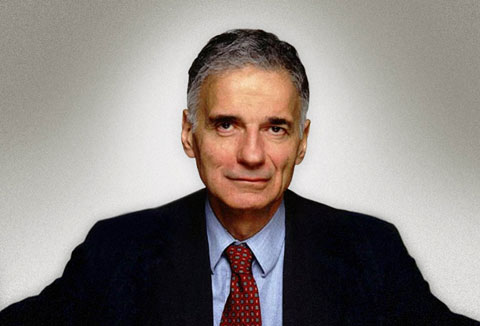 RALPH NADER From consumer advocacy to convergence |
During the past year Republican lawmakers in Maine and in Congress have stymied attempts by Democrats to raise the minimum wage. Democrats argue for decency: it’s impossible for workers to get by on $7.25 an hour (the federal minimum) or $7.50 (the state minimum).
Shenna Bellows, Maine’s Democratic United States Senate candidate, has made raising the federal minimum to $10.10 (supported by President Obama) a major plank in her platform. Her Republican adversary, incumbent Susan Collins, has opposed such a hike, but has also said she’s open to compromise.
Led locally by Governor Paul LePage, Maine and national Republicans argue that requiring companies to pay people more will force them to lay off workers. But recently there’s been a break in GOP ranks. Nationally, support has emerged for a minimum-wage increase on solid-Republican, business-friendly grounds.
This divergence was a big topic at an unusual conference on political convergence in Washington, DC, on May 27. “Unstoppable: A Gathering on Left-Right Convergence,” sponsored by consumer advocate Ralph Nader, featured 26 prominent liberal and conservative leaders discussing issues on which they shared positions. One was the minimum wage.
Ron Unz, former publisher of The American Conservative, told the 100 attendees, via Skype, that raising the minimum to a high-enough level would encourage people to work, shrink dependence on welfare, generate income-tax revenue, and provide “less incentive for businesses to hire illegal workers.” In California, Unz is pushing a ballot measure to raise the minimum to $12 an hour.
He noted that former Republican presidential nominee Mitt Romney recently came out for an increase, as have Romney’s 2012 primary rivals Tim Pawlenty and Rick Santorum and conservative television commentator Bill O’Reilly.
Other positions on which left- and right-wing panelists stood together included:
>> Wall Street crime and misdeeds. It was not lost on the gathering that both Occupy Wall Street and the Tea Party were infuriated that federal authorities protected the too-big-to-fail banks after the 2008 financial crisis they caused. Describing another attitude toward corporate wrongdoing, Zachary Kitts, a Virginia lawyer, gave details of his work representing whistleblowers against companies defrauding federal or state governments.
>> Civil liberties and privacy. Marc Rotenberg, of the Electronic Privacy Information Center, cited how conservatives and liberals worked together to get x-ray body scanners removed from airports. Heidi Boghosian, of the lefty National Lawyers Guild, described nonpartisan efforts “to debunk the government and corporate line that surveillance makes us safer.”
>> Corporate welfare. Greg LeRoy, of Good Jobs First, a critic of state economic-development giveaways, told of groups in Arizona with contrasting political complexions fighting for more transparency from that state’s business-development agencies. Pete Sepp, of the conservative National Taxpayers Union, spoke against agribusiness subsidies.
>> International trade. Moderating this panel, Nader described how the embrace of free-trade agreements by the “corporate Clintons” and “corporate Bushes” resulted in “the greatest loss of sovereignty in our nation’s history” because of priority in the treaties given to corporate profits over American law. Judson Phillips, of Tea Party Nation, said the secretly negotiated agreements run “roughshod” over the Constitution.
Nader optimistically saw a broad opposition coalescing to the other — and dominant — right-left convergence: the corporate-government elite. The conference’s title “Unstoppable” is also the title of Nader’s new book, subtitled: “The Emerging Left-Right Alliance to Dismantle the Corporate State.”